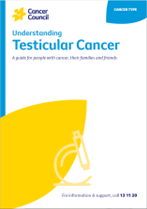- Home
- Testicular cancer
- Treatment
Testicular cancer treatment
In this section we look at the treatment options for testicular cancer.
Learn more about:
- Overview
- Fertility concerns
- Making treatment decisions
- Active surveillance
- Chemotherapy
- Radiation therapy
- Surgery to remove lymph nodes
- Palliative treatment
Overview
The treatment recommended by your doctors will depend on:
- your general health
- the type of testicular cancer you have (seminoma or non-seminoma)
- the size of the tumour
- the tumour marker levels on your blood test
- the number and size of any lymph nodes involved
- whether the cancer has spread to other parts of your body.
Most people have an orchidectomy to remove the affected testicle. If the cancer hasn’t spread, this may be the only treatment needed. After the surgery, you will need to have regular check-ups and tests to ensure that the cancer hasn’t come back. This is called active surveillance.
If the cancer has spread, after an orchidectomy you may have:
- chemotherapy to kill any remaining cancer cells and prevent the cancer from coming back
- radiation therapy to treat the lymph nodes in the abdomen
- more surgery to remove lymph nodes in the abdomen (retroperitoneal lymph node dissection or RPLND).
Fertility concerns
Effects on fertility
Chemotherapy, radiation therapy and RPLND can affect your fertility. This may be temporary or permanent. If you may want to have children in the future, ask your doctor for a referral to a fertility specialist before treatment starts. You may be able to store sperm for later use.
Using contraception during treatment
Even when treatment lowers the amount of sperm you make, there is still a chance a sexual partner could become pregnant. Because chemotherapy and radiation therapy can damage sperm, you will need to use barrier contraception (such as condoms or female condoms) during treatment to prevent pregnancy. Sometimes this may need to continue for some months after treatment finishes. Your doctor will discuss this with you in more detail.
For more on this, see Effects on fertility.
→ READ MORE: Making treatment decisions
Podcast: Making Treatment Decisions
Listen to more episodes from our podcast for people affected by cancer
More resources
Dr Benjamin Thomas, Urological Surgeon, The Royal Melbourne Hospital and The University of Melbourne, VIC; A/Prof Ben Tran, Genitourinary Medical Oncologist, Peter MacCallum Cancer Centre, Walter and Eliza Hall Institute of Medical Research and The University of Melbourne, VIC; Dr Nari Ahmadi, Urologist and Urological Cancer Surgeon, Chris O’Brien Lifehouse, NSW; Helen Anderson, Genitourinary Cancer Nurse Navigator, Gold Coast University Hospital, QLD; Anita Cox, Youth Cancer – Cancer Nurse Coordinator, Gold Coast University Hospital, QLD; Dr Tom Ferguson, Medical Oncologist, Fiona Stanley Hospital, WA; Dr Leily Gholam Rezaei, Radiation Oncologist, Chris O’Brien Lifehouse and Royal Prince Alfred Hospital, NSW; Dheeraj Jain, Consumer; Amanda Maple, 13 11 20 Consultant, Cancer Council SA; Jessica Medd, Senior Clinical Psychologist, Department of Urology, Concord Repatriation General Hospital and Headway Health, NSW.
View the Cancer Council NSW editorial policy.
View all publications or call 13 11 20 for free printed copies.

